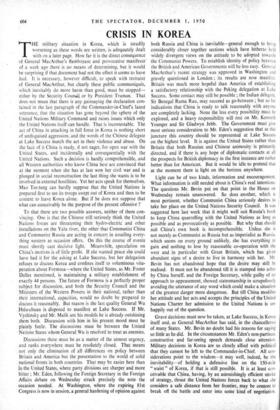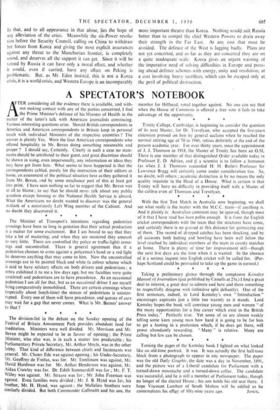CRISIS IN KOREA
THE military situation in Korea, which is steadily worsening as these words are written, is adequately dealt with on a later page. How far it is the direct consequence of General MacArthur's flamboyant and provocative manifesto– of a week ago there is no means of determining, but it would be surprising if that document had not the effect it seems to have had. It is necessary, however difficult, to speak with restraint of General MacArthur, but clearly these public communiqués, which inevitably do more harm than good, must be stopped— either by the Security Council or by President Truman. That does not mean that there is any gainsaying the declaration con- tained in the last paragraph of the Commander-in-Chief's latest utterance, that the situation has gone beyond the sphere of the United Nations Military Command and raises issues which only the United Nations itself can handle. That is incontestable. The act of China in attacking in full force in Korea is nothing short of undisguised aggression, and the words of the Chinese delegate at Lake Success match the act in their violence and abuse. On the face of it China is ready, if not eager, for open war with the United States, and incidentally and consequentially with the United Nations. Such a decision is hardly comprehensible, and all Western authorities who know China best are convinced that at the moment when she has at last won her civil war and is plunged in social reconstruction the last thing she wants is to be involved in external hostilities. Yet het acts speak for themselves. Mao Tse-tung can hardly suppose that the United Nations is prepared first to see its troops swept out of Korea and then to be content to leave Korea alone. But if he does not suppose that what can conceivably be the purpose of the present offensive ?
To that there are two possible answers, neither of them con- vincing. One is that the Chinese still seriously think the United Nations forces are threatening their hydro-electric and other ' installations on the Yalu river, the other that Communist China and Communist Russia are acting in concert in assailing every- . thing western as occasion offers. On this the course of events must shortly cast decisive light. Meanwhile, speculation on China's motives is of little profit. If she wanted peace she could have had it for the asking at Lake Success, but her delegation refuses to discuss Korea and confines itself to voluminous vitu- peration about Formosa—where the United States, as Mr. Foster Dulles mentioned, is maintaining a military establishment of exactly 44 persons. The future of Formosa is a perfectly proper . subject for discussion, and both the Security Council and the Ministers of the Western Powers in their national, rather than their international, capacities, would no doubt be prepared to ' discuss it reasonably. But reason is the last quality General Wu Hsiu-chuan is disposed to manifest at Lake Success. If Mr. Vyshinsky and Mr. Malik are his models he is already outshining them both. Discussion with him in his present mood must be plainly futile. The discussions must be between the United Nations States whom General Wu is resolved to treat as enemies.
Discussions there must be as a matter of the utmost urgency, . and ranks everywhere must be resolutely closed. That means . not only the elimination of all differences on policy between Britain and America but the presentation to the world of solid national fronts in both countries. That may be easier here than in the United States, where party divisions are sharper and more bitter ; Mr. Eden, following the Foreign Secretary in the Foreign Affairs debate on Wednesday struck precisely the note the occasion needed. At Washington, where the expiring 81st Congress is now in session, a general hardening of opinion against both Russia and China is inevitable—general enough to bring considerably closer together sections which have hitherto held widely divergent views on the attitude to be adopted towards the Communist Powers. To establish identity of policy between the British and American Governments will be less easy. General MacArthur's recent strategy was approved in Washington and gravely questioned in London ; its results are now manifest. Britain was much more hopeful than America of establishing a satisfactory relationship with the Peking delegation at Lake Success. Some contact may still be possible ; the Indian delegate, Sir Benegal Rama Rau, may succeed as go-between ; but so far indications that China is ready to talk reasonably with anyone are completely lacking. None the less every possibility must be explored, and a heavy responsibility will rest on Mr. Kenneth Younger and Sir Gladwyn Jebb. The Government must give most serious consideration to Mr. Eden's suggestion that at this juncture this country should be represented at Lake Success on the highest level. It is against the United States rather than Britain that both Russian and Chinese animosity is primarily directed, and if there is any hope of diplomatic contacts at all the prospects for British diplomacy in the first instance are rather better than for American. But it would be idle to pretend that at the moment there is light on the horizon anywhere.
Light can be of two kinds, information and encouragement. What information is still needed about is China's real intentions. The questions Mr. Bevin put on that point in the House on Wednesday remain unanswered. So does another, which is most pertinent, whether Communist China seriously desires to take her place on the United Nations Security Council. It was suggested here last week that it might- well suit Russia's book to keep China quarrelling with the United Nations as long as possible and as provocatively as possible: But why that should suit China's own book is incomprehensible.' Unless she is not merely as Communist as Russia but as imperialist as Russia, which seems on every ground unlikely, she has everything to gain and nothing to lose by reasonable co-operation with the west and in particular with Great Britain, which has given abundant signs of a desire to live in harmony with her. Mr. Bevin has not abandoned hope that the desire may still be realised. It must not be abandoned till it is stamped into ashes by China herself, and the Foreign Secretary, while guilty of no approach to appeasement, showed statesmanship in scrupulously avoiding the utterance of any word which could make a situation of the greatest danger more dangerous. But till China modifies her attitude and her acts and accepts the principles of the United Nations Charter her admission to the United Nations is un- happily out of the question.
Grave decisions must now be taken, at Lake Success, in Korea itself and, as General MacArthur has said, in the chancelleries of many States. Mr. Bevin no doubt had his reasons for saying so little as he did. In the circumstances Mr. Eden's non-partisan, _constructive and far-seeing speech demands close attention. Military decisions in Korea are so closely allied with political that they cannot be left to the Commander-in-Chief. All con- siderations point to the wisdom—it may well, indeed, be the inevitability—of holding a defensive line on the 150-mile " waist " of Korea, if that is still possible. It is at least con- ceivable that China, having, by an astonishingly efficient stroke of strategy, thrust the United Nations forces back to what she considers a safe distance from her frontier, may be content to break off the battle and enter into some kind of negotiation. In that, and to all appearance in that alone, lies the hope of any alleviation of the crisis. Meanwhile the six-Power resolu- tion before the Security Council, calling on China to withdraw her forces from Korea and giving the most explicit assurances against any threat to the Manchurian frontier, is completely sound, and deserves all the support it can get. Since it will be vetoed by Russia it can have only a moral effect, and whether it would, even if carried, have any effect on Peking is problematic. But, as Mr. Eden insisted, this is not a Korea crisis, it is a world-crisis, and Western Europe is an incomparably more important theatre than Korea. Nothing would suit Russia better than to compel the chief Western Powers to drain away their strength in the Far East. At any cost that must be avoided. The defence of the West is lagging badly. Plans are not yet concerted, and so far as they are concerted they are on a quite inadequate scale. Korea gives an urgent warning of the imperative need of solving difficulties in Europe and press- ing ahead defence schemes with energy, unity and resolution, at a cost involving heavy sacrifices, which can be escaped only at the peril of political destruction.







































 Previous page
Previous page